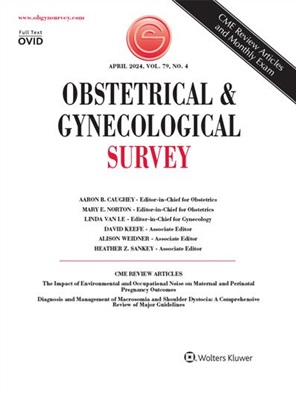Therapeutic Rest as an Intervention in Early Labor: A Literature Review.
IF 3.6
4区 医学
Q1 OBSTETRICS & GYNECOLOGY
引用次数: 0
Abstract
Importance The latent phase of labor poses a challenge for pregnant patients due to the limited options available for pain relief and management. Therapeutic rest, an intervention involving medication administration during this phase, has shown promise in addressing prelabor discomfort and anxiety. Objective To emphasize the significance of therapeutic rest during early labor, describe methods of administering this intervention, review data on efficacy and maternal/fetal outcomes, and determine appropriate criteria and timing of utilization. Evidence Acquisition Articles were obtained from a thorough PubMed literature search; relevant articles were reviewed. Results Studies have shown that delaying admission to active labor benefits maternal and fetal outcomes. Pregnant patients admitted in the latent phase are at greater risk for obstetric interventions and have heightened emotional challenges. However, administering therapeutic rest during this phase has shown promising outcomes without significantly increasing the risks of adverse events. Randomized controlled trials are needed to evaluate the efficacy of therapeutic rest on subsequent admission rates for patients in active labor. Conclusions Therapeutic rest offers a favorable approach to managing pain and discomfort in early labor. Although there are criteria and contraindications, the interventions have shown effectiveness without substantial adverse effects, providing a potential outpatient management strategy for the latent phase of labor. Relevance This review offers insight into potential interventions and outcomes for managing the latent stage of labor in pregnant patients.作为早期分娩干预措施的治疗性休息:文献综述。
重要性由于缓解和控制疼痛的方法有限,分娩潜伏期给孕妇带来了挑战。研究表明,推迟进入活跃产程对产妇和胎儿的预后都有好处。在潜伏期入院的孕妇接受产科干预的风险更大,情绪方面的挑战也更大。然而,在这一阶段进行治疗性休息已显示出良好的效果,且不会显著增加不良事件的风险。需要进行随机对照试验,以评估治疗性休息对活跃产程患者后续入院率的影响。尽管存在标准和禁忌症,但这些干预措施已显示出有效性,且无重大不良影响,为分娩潜伏期提供了一种潜在的门诊管理策略。相关性本综述深入探讨了管理妊娠患者分娩潜伏期的潜在干预措施和结果。
本文章由计算机程序翻译,如有差异,请以英文原文为准。
求助全文
约1分钟内获得全文
求助全文
来源期刊
CiteScore
2.70
自引率
3.20%
发文量
245
审稿时长
>12 weeks
期刊介绍:
Each monthly issue of Obstetrical & Gynecological Survey presents summaries of the most timely and clinically relevant research being published worldwide. These concise, easy-to-read summaries provide expert insight into how to apply the latest research to patient care. The accompanying editorial commentary puts the studies into perspective and supplies authoritative guidance. The result is a valuable, time-saving resource for busy clinicians.

 求助内容:
求助内容: 应助结果提醒方式:
应助结果提醒方式:


